'I look fine but inside I feel like an imposter'
- Published
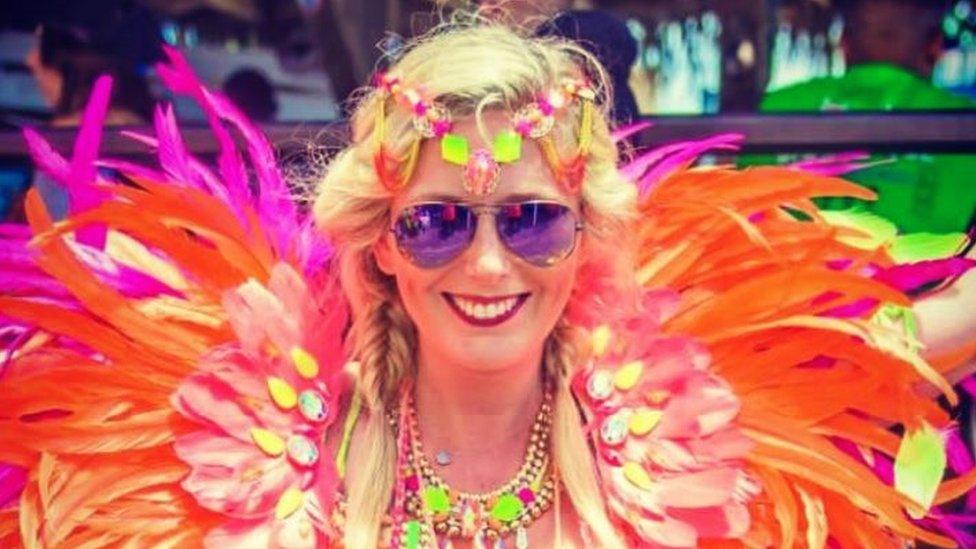
Claire Stephens' life changed forever during a massage in the Cayman Islands
Claire Stephens was 27 and living in the Cayman Islands when an aneurysm ruptured in her brain. She had to be airlifted to Miami for lifesaving surgery - doctors had doubted she would survive the flight.
The surgery was successful but as she was recovering, she found out she had lost her job and consequently her island home.
Now living in Penryn, Cornwall, Claire is sharing her story in a bid to challenge the stigma around brain injury.
Here, in her own words, she explains how her ordeal has changed her.
'I want to drop out'
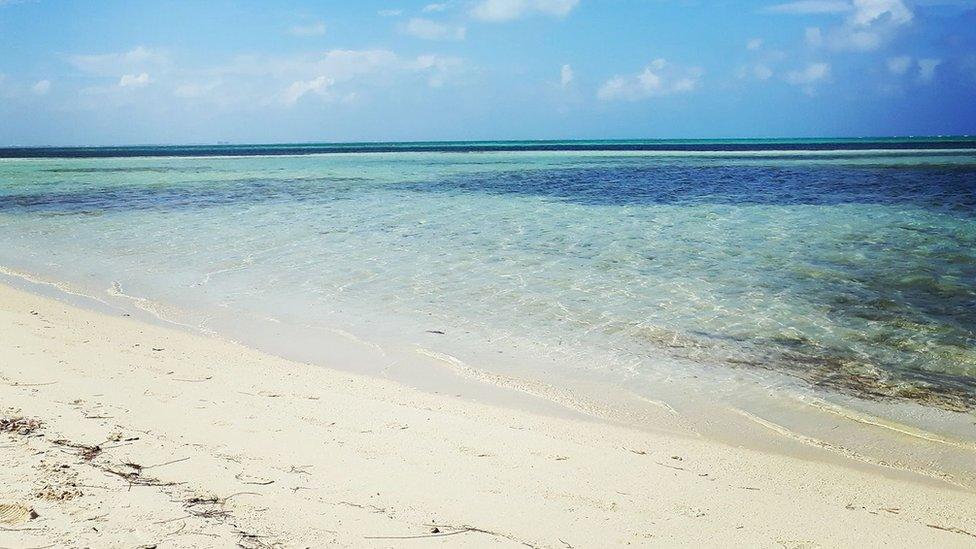
Grand Cayman has one road and the island is only 22 miles long
I was born and raised in Dallas, Texas. My family is British and my parents have since moved back to the UK.
I went to college but ended up doing what every parent dreads - I told them I wanted to drop out and move to the Caribbean. As much as they wanted me to finish uni they did support me and I later finished my degree through distance learning while living in the Cayman Islands.
You have to have a job lined up to go out there so I started applying and got one straight away. I ended up living there and working in bars for six years. It was awesome.
'He is mine'
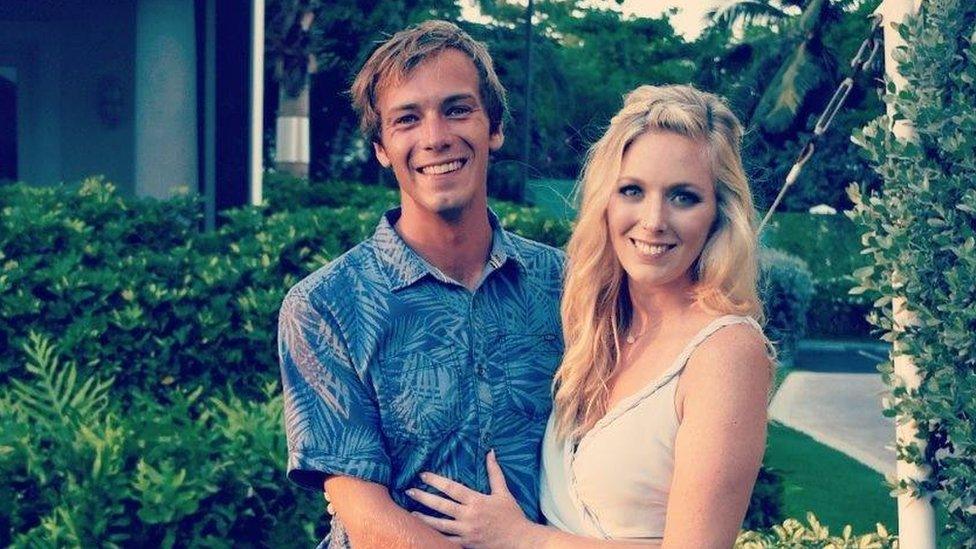
Claire and Joe have been together for four years
I met my partner Joe there. Not a lot of eligible bachelors come to the island so when he started working for the same company as me, I hate to say it but I claimed him. He knows it. He arrived and I told everyone "he's mine, I've lived here long enough".
It may have been a bit stalker-ish but we've been together four years now.
I've always had headaches but then I had about three or four months of really severe headaches that would last days and nothing would get rid of them.
I wasn't particularly worried. We were always having a drink and I was a smoker so I thought it was a consequence of the lifestyle I was living.
'It felt like a pop'
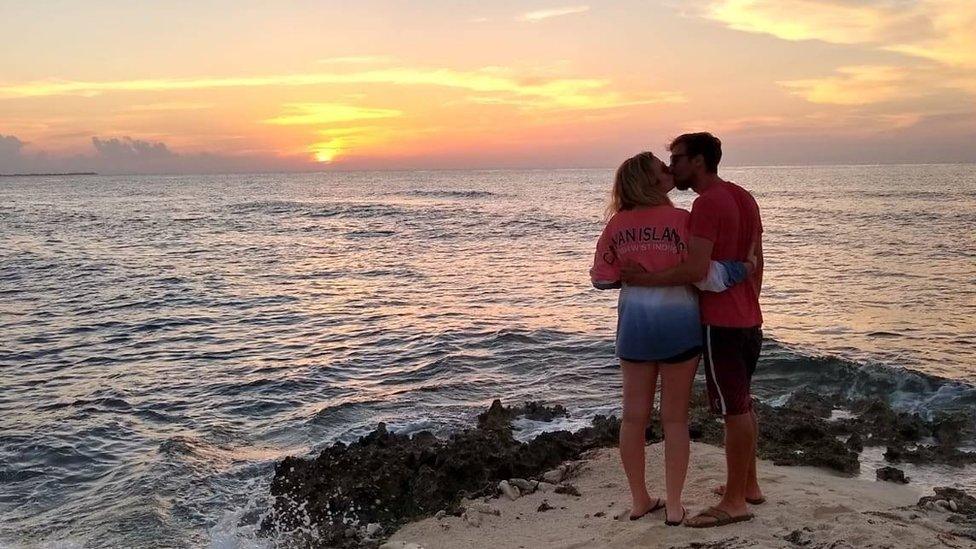
Claire says she is lucky to have a loving family and a great boyfriend
My parents were visiting and my mum and I decided to go for a massage.
We were right next to each other, just having a laugh and they were massaging my feet when it happened.

Brain aneurysm
An aneurysm is a bulge in a weakened blood vessel where the blood pressure causes a small area to bulge outwards like a balloon.
Most brain aneurysms only cause noticeable symptoms if they burst, which leads to a serious condition called a subarachnoid haemorrhage.
Source: NHS

It felt like a pop and I screamed "call 911". It was like someone had taken a metal pole to the back of my head.
That's what they call a thunderclap headache. It's described as the worst headache of your life and it was. It's when the aneurysm ruptured.
'I didn't know if I was going to live or die'
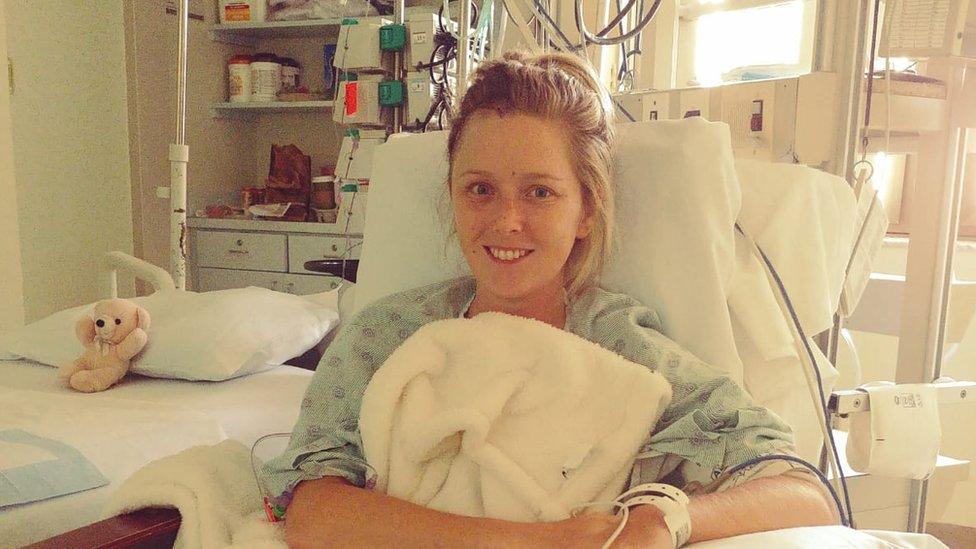
"I was just there screaming in pain"
I was in so much pain that I couldn't process what was going on. Once they realised there was a bleed you just saw people running out of the room.
They said they had to do an angiogram, which is where they go in through the femoral artery in the groin and get a better picture. It turns out my next-door neighbour was the one who to do that. There's no modesty living on a small island.
Unfortunately, the one neurosurgeon on Grand Cayman was on holiday.
They didn't allow my family to be with me so I spent that night alone in the ICU, not knowing whether or not I would live or die.
The next day I got airlifted to Miami.
'Is she alive?'
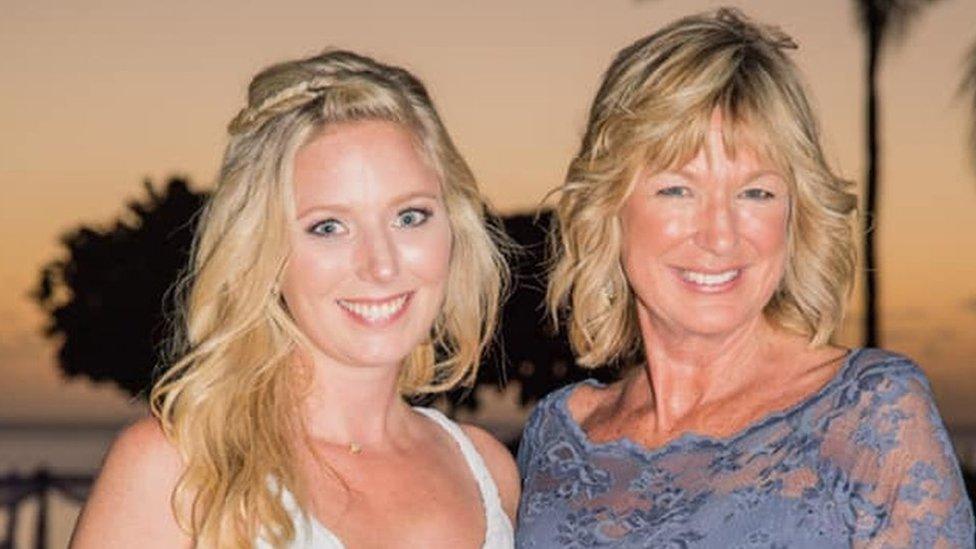
Claire's mum Julie was with her on the emergency flight to Miami
They didn't think I'd survive the flight because you aren't supposed to fly with a burst aneurysm. That's such a terrifying thought.
By that point they had me on fentanyl so I wasn't in a state to be comprehending information but I remember landing in Miami and a customs agent asked "is she alive?"
I was rushed to Jackson Memorial Hospital and taken to their neuro ICU ward.
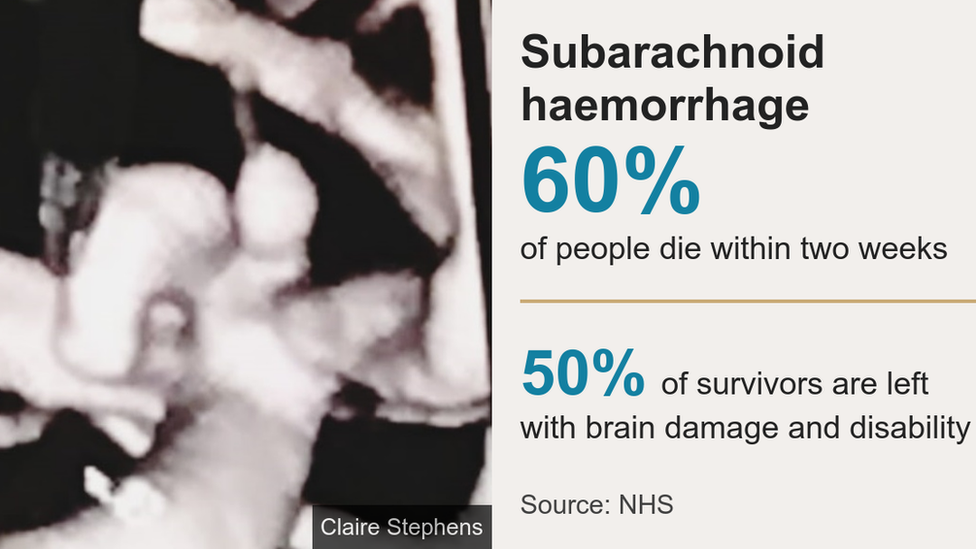
My surgeon was amazing but he had to tell me about the risks of surgery. That was horrific. He talked about the risks of death and severe disability. It made me sick - I was vomiting and choking.
Not having the surgery would kill me but having the surgery could kill me.
They operated on 15 March last year - two days after the aneurysm ruptured.
'A grim place'
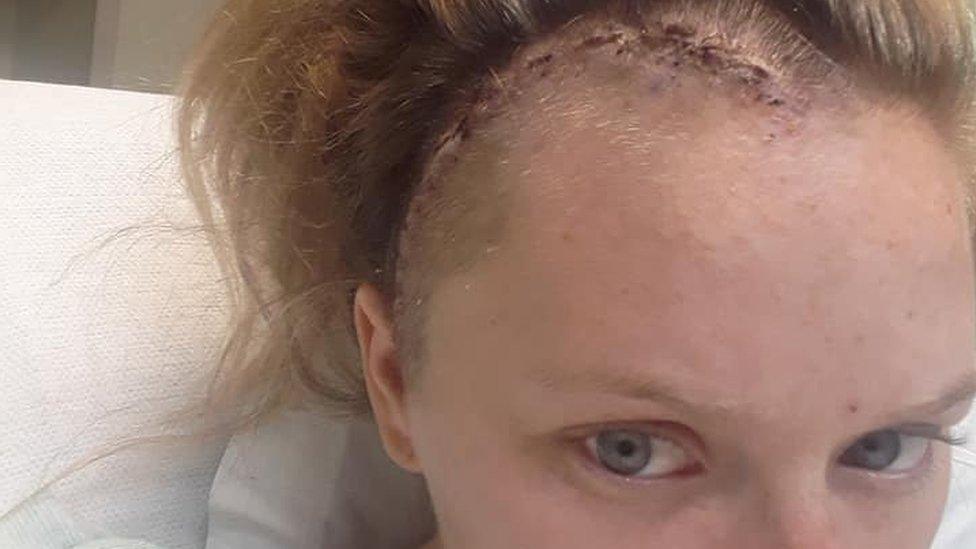
Claire says she has had a constant headache since waking up from surgery in March 2019
I spent three weeks in hospital. I was the only verbal patient on the entire neuro ICU ward. It was a really grim place to be.
In Miami my family was with me every single moment and that had such a massive impact on my recovery. I can't imagine people going through it now with Covid, not being able to have family there.
The day I was being discharged, Joe was at work and my manager came up to him and said 'could you find out when Claire's coming back to work? I'd hate for her to lose her job'.
Two weeks later I got fired. It was devastating.
I'd been working there for five years. Everything I had known was stripped away in a matter of weeks.
We decided to move to the UK to be closer to my parents but I felt incredibly lost. Joe was excited because for him it was coming home; for me it was starting over.
I was looking forward to creating friendships. I thought it would be as easy as it was in the Cayman Islands but I've found it harder than I thought.
'Everything was different'
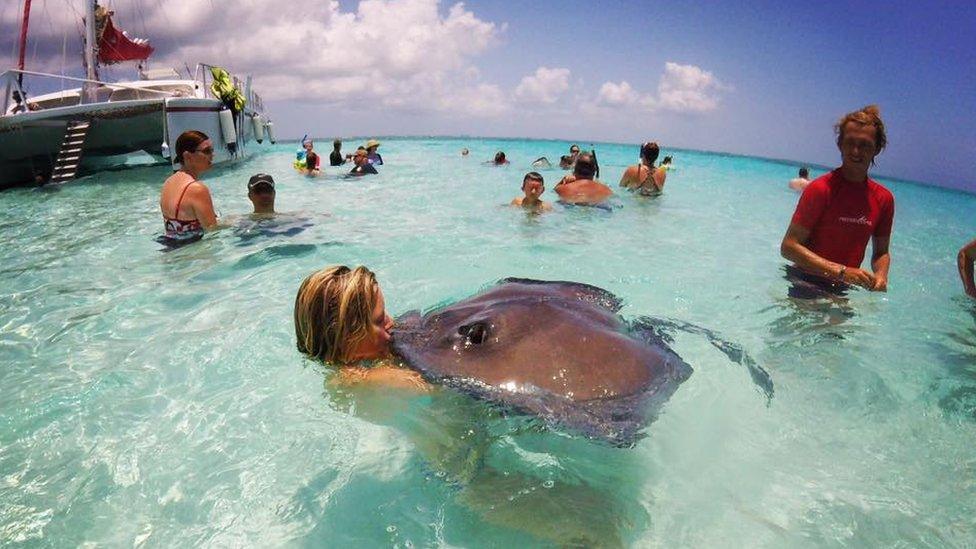
You have to have a job to be able to stay in the Cayman Islands, Claire says
Nothing prepared me for how different I was going to feel after the operation.
My attention span is different, my memory is different, the way I handle emotions is different.
These things have changed and, while they seem small, they are huge to me.
I've also had a headache ever since, a constant headache that would probably debilitate most people.
I've been having trouble getting treatment. They were trying pre-Covid and were going to try Botox and nerve blocks. There are so many options but I can't seem to get appointments any more and that's really disheartening.
On the outside I look fine but on the inside I feel like an imposter, I feel like a completely different person and it's hard but the show must go on.
'600 rejections and counting'
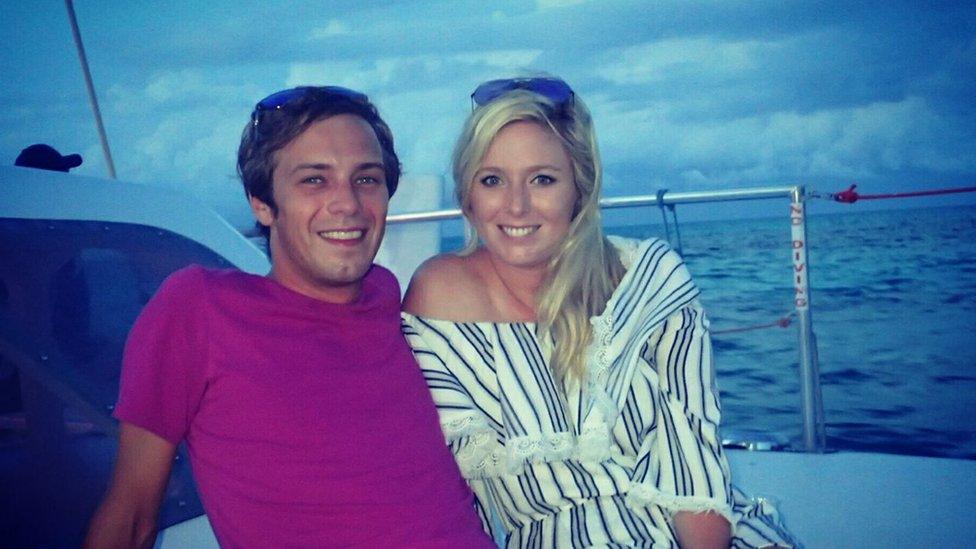
The couple had to pack up their lives and leave the Cayman Islands
Since March, I've applied for hundreds of jobs.
It has been pretty brutal, over 600 rejections and counting. I can't really see any reason other than the fact that I have been open and honest about my aneurysm.
When anyone hears I've had a brain injury I think they automatically think of something so negative. That's part of why I want to talk about my experiences. There's such a negative stigma around brain injury. For me, hearing positive stories helped so much.
Having an aneurysm doesn't mean that you are a ticking time bomb. These things grow for 15 or 20 years inside your head so it's not like you're going to suddenly pop up another one.
'Incredibly lucky'
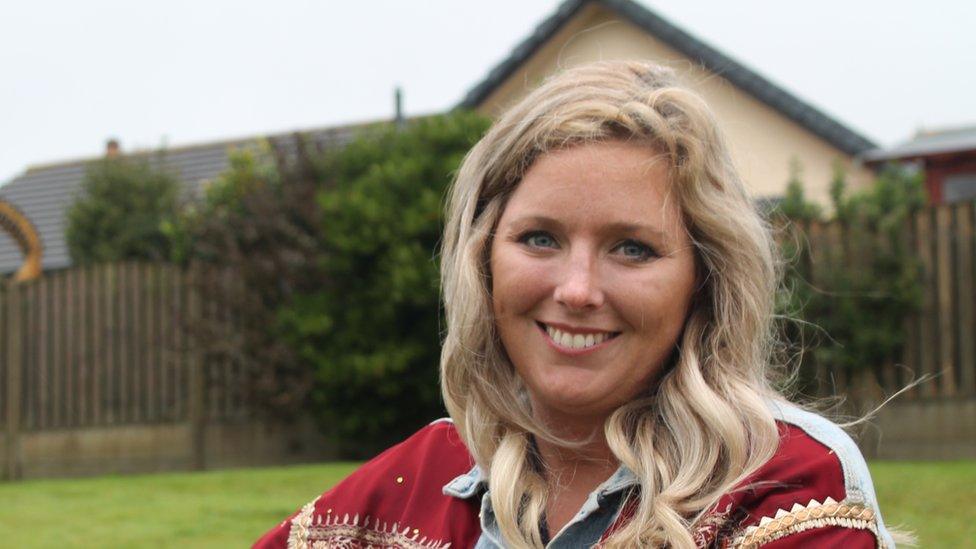
Claire says she's survived against all the odds
I want people to read this and know it is OK to have bad days but there are so many good ones ahead.
Look at my story - I've survived against all the odds.
This has been an incredibly testing 18 months, the hardest of my life. I've shed a lot of tears but I do feel lucky. I may not have found my sole purpose just yet but it has got to be coming.
I haven't given up. I'm still trying and I'm ever hopeful that something is going to turn out. Yes, I've had a bit of a rough time but I'm alive and that's a positive.
As told to Johanna Carr
- Attribution
- Published6 February 2020

- Published21 March 2019
